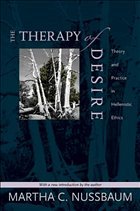The Epicureans, Skeptics, and Stoics practiced philosophy not as a detached intellectual discipline, but as a worldly art of grappling with issues of daily and urgent human significance: the fear of death, love and sexuality, anger and aggression. Like medicine, philosophy to them was a rigorous science aimed both at understanding and at producing the flourishing of human life. In this engaging book, Martha Nussbaum examines texts of philosophers committed to a therapeutic paradigm--including Epicurus, Lucretius, Sextus Empiricus, Chrysippus, and Seneca--and recovers a valuable source for our moral and political thought of today.
Review:
... By turns wise and witty, silly and Socratic, critical and compassionate, Nussbaum proves to be an extraordinarily addictive literary companion.... She has triumphantly proved ... that the life of the mind can be one of the highest and most rewarding pursuits known to man, including woman.... If Nikidion got one-tenth of the pummeling, excitement, and stimulation in the Garden of Epicurus that Nussbaum provides, intellectually and emotionally, in this densely argued volume, I should be very much surprised.... This is a book to live with. Peter Green(The New Republic)
... Nussbaum adventurously straddles boundaries conventionally drawn between philosophy and its own history, between philosophy and literature, and between scholarship and the social sciences.... Few modern books have done as much as this one promises to do in raising the profile of Hellenistic philosophy. It is constantly gripping and absorbing, written with rare eloquence and containing long stretches of almost lyrical intensity. A literary as well as a philosophical tour de force.. David Sedley(The Times Literary Supplement)
... Nussbaum writes as an advocate [of the Hellenistic philosophers], though not an uncritical one, for even while she admires the seriousness and subtlety with which these philosophers analyze the passions, she allows that there is an unresolvable conflict between the detachment and the intense engagement entailed by their philosophies. The sense that these philosophers still matter, that we can wrangle with them and learn from them, is invigorating. Richard Jenkyns(The New York Times Book Review)
Table of contents:
Acknowledgments
List of Abbreviations
Introduction
3
Ch. 1
Therapeutic Arguments
13
Ch. 2
Medical Dialectic: Aristotle on Theory and Practice
48
Ch. 3
Aristotle on Emotions and Ethical Health
78
Ch. 4
Epicurean Surgery: Argument and Empty Desire
102
Ch. 5
Beyond Obsession and Disgust: Lucretius on the Therapy of Love
140
Ch. 6
Mortal Immortals: Lucretius on Death and the Voice of Nature
192
Ch. 7
"By Words, Not Arms": Lucretius on Anger and Aggression
239
Ch. 8
Skeptic Purgatives: Disturbance and the Life without Belief
280
Ch. 9
Stoic Tonics: Philosophy and the Self-Government of the Soul
316
Ch. 10
The Stoics on the Extirpation of the Passions
359
Ch. 11
Seneca on Anger in Public Life
402
Ch. 12
Serpents in the Soul: A Reading of Seneca's Medea
439
Ch. 13
The Therapy of Desire
484
List of Philosophers and Schools
511
Bibliography
517
Index Locorum
531
General Index
550
"Filled with many beautifully written and powerful passages, this book will provoke lively discussion among specialists and show nonspecialists how much there is to be gained from a serious study of this period."--Brad Inwood, University of Toronto
Review:
... By turns wise and witty, silly and Socratic, critical and compassionate, Nussbaum proves to be an extraordinarily addictive literary companion.... She has triumphantly proved ... that the life of the mind can be one of the highest and most rewarding pursuits known to man, including woman.... If Nikidion got one-tenth of the pummeling, excitement, and stimulation in the Garden of Epicurus that Nussbaum provides, intellectually and emotionally, in this densely argued volume, I should be very much surprised.... This is a book to live with. Peter Green(The New Republic)
... Nussbaum adventurously straddles boundaries conventionally drawn between philosophy and its own history, between philosophy and literature, and between scholarship and the social sciences.... Few modern books have done as much as this one promises to do in raising the profile of Hellenistic philosophy. It is constantly gripping and absorbing, written with rare eloquence and containing long stretches of almost lyrical intensity. A literary as well as a philosophical tour de force.. David Sedley(The Times Literary Supplement)
... Nussbaum writes as an advocate [of the Hellenistic philosophers], though not an uncritical one, for even while she admires the seriousness and subtlety with which these philosophers analyze the passions, she allows that there is an unresolvable conflict between the detachment and the intense engagement entailed by their philosophies. The sense that these philosophers still matter, that we can wrangle with them and learn from them, is invigorating. Richard Jenkyns(The New York Times Book Review)
Table of contents:
Acknowledgments
List of Abbreviations
Introduction
Ch. 1
Therapeutic Arguments
Ch. 2
Medical Dialectic: Aristotle on Theory and Practice
Ch. 3
Aristotle on Emotions and Ethical Health
Ch. 4
Epicurean Surgery: Argument and Empty Desire
Ch. 5
Beyond Obsession and Disgust: Lucretius on the Therapy of Love
Ch. 6
Mortal Immortals: Lucretius on Death and the Voice of Nature
Ch. 7
"By Words, Not Arms": Lucretius on Anger and Aggression
Ch. 8
Skeptic Purgatives: Disturbance and the Life without Belief
Ch. 9
Stoic Tonics: Philosophy and the Self-Government of the Soul
Ch. 10
The Stoics on the Extirpation of the Passions
Ch. 11
Seneca on Anger in Public Life
Ch. 12
Serpents in the Soul: A Reading of Seneca's Medea
Ch. 13
The Therapy of Desire
List of Philosophers and Schools
Bibliography
Index Locorum
General Index
"Filled with many beautifully written and powerful passages, this book will provoke lively discussion among specialists and show nonspecialists how much there is to be gained from a serious study of this period."--Brad Inwood, University of Toronto
Es gelten unsere Allgemeinen Geschäftsbedingungen: www.buecher.de/agb
Impressum
www.buecher.de ist ein Shop der
buecher.de GmbH & Co. KG
Bürgermeister-Wegele-Str. 12,
86167 Augsburg
Amtsgericht Augsburg HRA 13309
Persönlich haftender Gesellschafter: buecher.de Verwaltungs GmbH
Amtsgericht Augsburg HRB 16890
Vertretungsberechtigte:
Günter Hilger, Geschäftsführer
Christian Sailer, Geschäftsführer
Sitz der Gesellschaft:Augsburg
Ust-IdNr. DE 204210010
